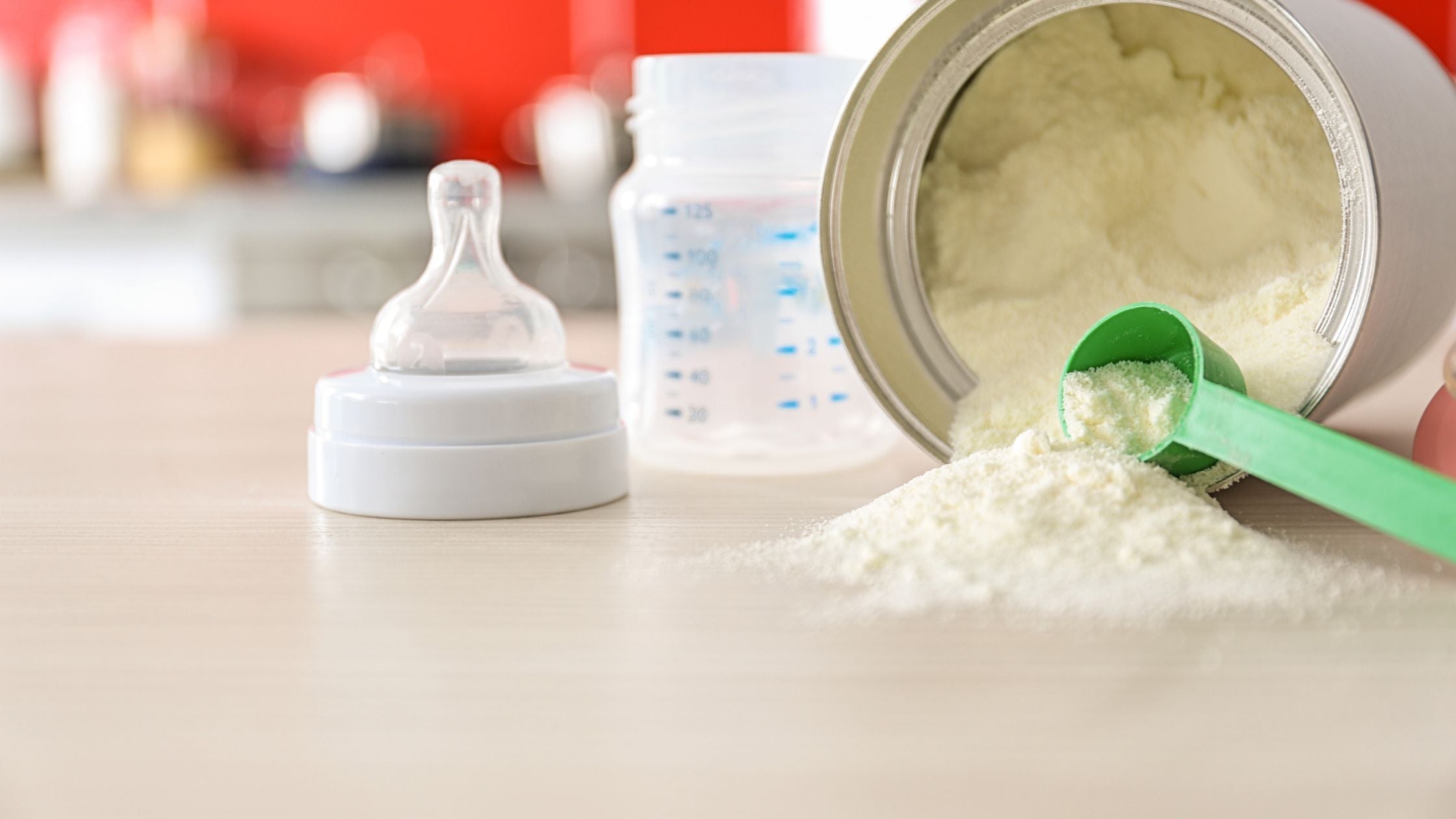When it comes to feeding our little ones, we want to ensure they receive the best nutrition possible. This combined with recent hot topic debates on palm oil and its health effects have many parents concerned, especially when they see palm oil listed as an ingredient in their baby formulas.
However, as with everything else that you read and see online, it's essential to understand the reason why palm oil is often included and why it's not as bad as it may seem. Spoiler - it's mostly a misconception between the sustainability concerns of palm oil, and less so its health effects.
TL;DR - Here's What We'll Be Covering:
- Human breastmilk fats contain 1/3 palmitic acid
- Skim Milk vs Whole Milk baby formula
- Digging into Palmitic Acids
- Calcium Soaps - why you shouldn't worry
- Benefits of Palm Oil
- The Sustainability Debate
- The Role of Palm Oil
Backstory - Make it Like Momma's Milk!
Let's take a step back and understand the two main kinds of milk and milk fats that are used in baby formulas. It's also critical to understand the main constituents of human breastmilk and where the calories come from. Surprise surprise - it's FAT. The fat in breastmilk contributes to more than 60% of the total caloric value. That means that most of your baby's nutritional intake is coming from the fat content of breastmilk.
What kind of fat? Palmitic Acid, to be precise. Name sound familiar?
That's because palmitic acid is the main form of saturated fatty acid found in plants and animals. In fact, it makes up to 60% of fats in all mammal milks and dairy products, but it is also the main form of fat found in the palm oil tree (up to 45%).
And - Human milk is no exception. Human breastmilk also contains saturated and unsaturated fats. Saturated fats account for roughly 60% of the fats in breastmilk and palmitic acid accounts also for roughly 60% of those saturated fats.
That means that, all together, palmitic acid accounts for about 1/3 or more of the fats found in human breastmilk (research link).
So let that sink in for a moment - the fat in Human breastmilk is composed of roughly 1/3 Palmitic Acid.
Remember - all baby formulas strive to mimic human breastmilk in nutritional content as close as possible with their ingredients, and European formula brands like HiPP and Holle are no exception.
Skim Milk vs. Whole Milk Based Infant Formulas
Most European baby formulas utilize skim milk as their milk base. All of HiPP's Combiotik Organic formula (both German and Dutch) and Holle Cow's line (with the exception of Holle Cow PRE) utilizes skim milk as the base, where most of the fat is completely removed from the milk itself. During the manufacturing process, fat is then re-added to balance and closely resemble human breastmilk, with the addition of Palm Oil (palmitic acid), Fish Oil (for Omega Fatty acids) and sometimes various other plant-based oils.
However, some European formulas like Holle Cow PRE, Holle Goat and all Kendamil Formulas (including Kendamil Classic, Kendamil Organic and Kendamil Goat Formulas) utilize a whole-milk base. The reason? With stricter regulations in the EU - some companies have resorted to formulating infant formulas with whole milk to avoid the addition of palm oils and other synthetic oils which may cause constipation in some infants. However, its important to note that not all palm oil is the same, as some palm oils more closely resemble Beta Palmitate - The SN-2 esterified position of Palmitic Acid. HiPP Comfort is one formula that includes this special oil blend to help in digestion.
It mostly boils down to preference and to enhance flavor and taste. This is especially true of Goat-milk based formulas that have a slightly tangier and gamier taste to them. This is in addition to establishing a market presence and prominence and catering to different parents and their perceptions.
Digging into Palmitic Acid - Breast Milk vs Whole Milk vs Goat Milk vs Palm Oil
We've already established that Palmitic acid is the main saturated fat in all mammalian milks. But there is another aspect that we have to address - and that's the type of palmitic acid that breast milk and other baby formulas contain.
One piece of interesting research however is back to the Palmitic acid content. This research paper from Nutrients 2020 titled "Whole Goat Milk as a Source of Fat and Milk Fat Globule Membrane in Infant Formula" indicates the average palmitic acid composition in various infant formulas, especially between those composed of whole milk (cow or goat) and skim milk with added vegetable oils.

It found that the infant formulas that were cow milk based with the addition of vegetable oils more closely mimicked the natural composition of human breast milk with SN-2 fatty acids with higher concentrations of sn-2 palmitic acid when manufactured with structured palm oil than any other whole-milk based formula.
The Calcium Soaps Debate - Why Palm Oil-Free Isn't Always Better
One of the most frequently cited concerns about palm oil in formula is its potential to cause digestive issues, such as harder stools or poor calcium absorption. However, these effects are not universally experienced, and modern formulas have evolved to balance the presence of palm oil with other fats, improving their digestibility. Many formulas combine palm oil with other vegetable oils to reduce any unwanted side effects, creating a well-rounded product that delivers the necessary nutrients without compromising comfort.
And, Palm Oil-Free doesn’t always mean better. Some formulas advertise that they are "palm oil-free" to attract consumers who are wary of this ingredient. While this may seem like a healthier choice, it’s important to note that palm oil alternatives may also come with their own drawbacks. For instance, some alternatives like coconut oil or soy oil may not offer the same balance of fatty acids necessary for infant nutrition. When choosing a formula, it’s important to consider the overall composition of the fats and how they mimic those in breast milk, rather than focusing on the presence or absence of any one ingredient.
The Benefits of Palm Oil in Baby Formulas
Palm oil is a common ingredient in baby formulas for several reasons:
- Source of Healthy Fats: Palm oil is rich in healthy saturated and unsaturated fats, which are necessary for a baby's growth and development.
- Easy to Digest: The structure of palm oil is similar to human breast milk, making it easier for babies to digest.
- Enhances Nutrient Absorption: Palm oil helps the body absorb essential fat-soluble vitamins, such as Vitamin A, D, E, and K.
The Sustainable Palm Oil Debate
One of the main concerns surrounding palm oil is its impact on the environment. Palm oil production has been linked to deforestation and habitat destruction, leading to the endangerment of wildlife, such as Orangutans.
However, it's important to note that not all palm oil is created equal. Sustainable palm oil from HiPP and
A lot of the negativity around palm oil is around its sustainability, and not its health effects.
The Role of Palm Oil in Infant Health
Palm oil plays a vital role in infant health and development. It provides essential fatty acids that support brain development, immune function, and overall growth. It also helps babies absorb vital nutrients that are crucial during their early years.
Furthermore, palm oil has a creamy texture and mild taste, making it more palatable for babies. This can be especially beneficial for picky eaters or those who have difficulty accepting other types of fat in their diet.
The Bottom Line
While the use of palm oil in baby formulas may raise concerns, it is important to consider the benefits it offers. When sourced sustainably, palm oil can provide essential nutrients and support healthy growth and development in infants. As responsible consumers, we should look for brands that prioritize sustainable practices and make informed choices for our little ones.
Remember, always consult with your paediatrician or healthcare professional before making any changes to your baby's diet.










